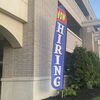How does limiting debate on TPP trade agreement serve the public?
In October 2011, more than a year before his election as Maine's junior U.S. senator, Angus King wrote a commentary for Bowdoin College's student newspaper suggesting that free trade isn't always what it's cracked up to be. He takes aim at the Trans-Pacific Partnership, the largest proposed free trade agreement in history that's now in the final stages of negotiations between the United States and 11 Pacific Rim countries.
Here's what King wrote:
“Imagine the governor of one of our states going to the Congress and making the following argument: 'We are a small state that is struggling economically; we're predominantly rural and would like to expand our manufacturing base. But it's hard because we're subject to those onerous federal environmental laws, which make building factories more expensive, as well as those pesky federal safety and wage and hour laws, which drive up the cost of labor.
'So we would appreciate it if you would exempt us from all those laws; then, we could attract jobs from the rest of the United States and sell our products for less than what they would cost to make in the other states. Consumers in the other states would get cheaper goods and we'd get lots of new jobs. And maybe, eventually, our economy will improve to the point where we can buy stuff from the other states as well. So how about it?'
Sound preposterous? Absolutely; the guy would be laughed out of Congress and not even get through the door at the White House. And yet, this is essentially what happens when we sign a free trade agreement with another country, especially one with minimal environmental and labor laws. In terms of trade and access to our markets they are, in effect, becoming states — no tariffs, no borders, no hassles —but very special states, indeed, exempt from the rules that apply to their competitors unlucky enough to still be located in one of the original 50.”
Unfortunately, those musings aren't preposterous. That scenario has been playing out in secret TPP negotiations, with Vietnam seeking the elimination of tariffs designed to protect the few remaining shoemakers left in the United States, most notably 850-plus workers at New Balance's Maine factories in Norridgewock, Skowhegan and Norway and another 500 workers at the Boston-based company's two factories in Massachusetts.
Vietnamese shoemakers make an average of $90 to $129 a month, about 38% of what shoemakers in China now make. Vietnam is now the world's No. 2 shoemaker after China. In anticipation that the TPP will, in fact, eliminate footwear tariffs, the footwear industry is accelerating the movement of manufacturing facilities into Vietnam. Nike Inc., the world's largest shoemaker, had sales last year of $27.8 billion, a 10% gain. According to its website, it has 333,591 workers at 67 factories in Vietnam, with 39% of them making footwear. Nike wants the footwear tariffs eliminated.
New Balance workers make $12 to $14 per hour with benefits — earning more in one day than Vietnamese shoemakers earn in one month. New Balance, which makes 25% of its shoes in the United States, doesn't want the footwear tariffs eliminated.
Under the fast track bill now being debated in D.C., the Obama administration wants Congress to allow the president to finalize the still-secret TPP deal and present it to lawmakers for an up-or-down vote later this year. If Congress acquiesces, and lifting tariffs on Vietnamese-made shoes is part of the deal, there'd be no real debate over how that might impact Maine's economy that already has lost more than 30,000 manufacturing jobs since the North Atlantic Free Trade Agreement was adopted in 1994. There'd be no chance to amend thousands of pages negotiated in secret, including a provision leaked to the New York Times and published in March that would allow multinational corporations to challenge any domestic law — not in a U.S. court, by the way — that hurts their profits.
If Congress grants fast track provisions of limited debate and no opportunities for amendments when a trade agreement negotiated in secret eventually comes up for a vote, doesn't it seem preposterous to call the process democratic?
Read more
Collins, King split on 'fast track' vote that Obama lost in Senate










Comments